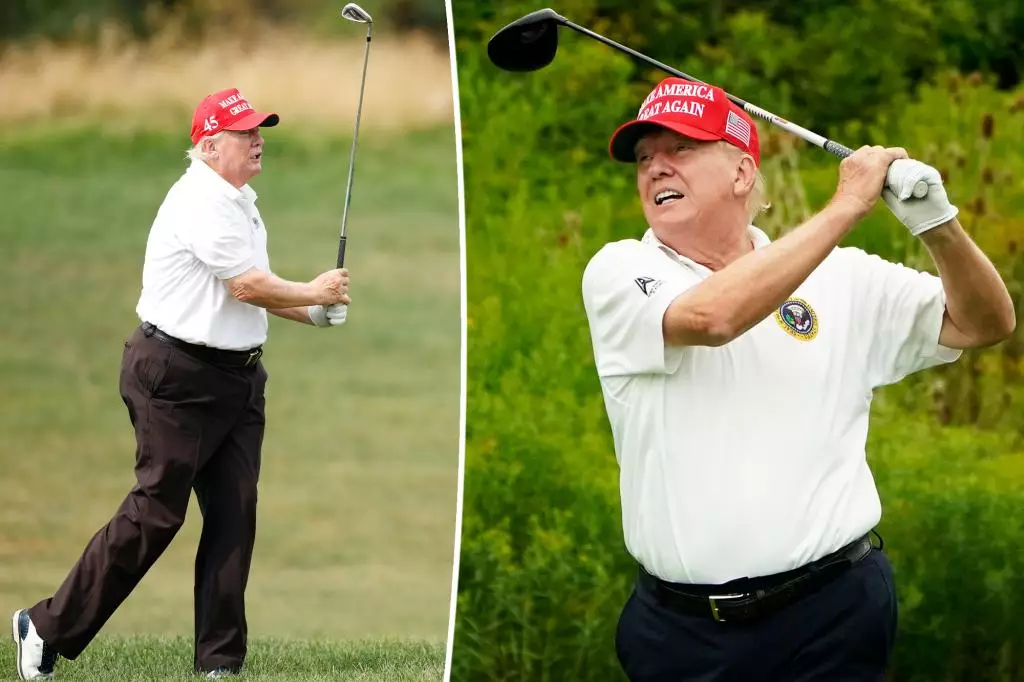The intersection of leisure and leadership is often a subject ripe for speculation, and former President Donald Trump’s recent golfing weekend exemplifies this dynamic in a unique manner. Spending time on the green with family, in this case, his granddaughters, alongside tech titan Elon Musk, Trump has further ignited conversations surrounding his future commitments to golf now that he has returned to the political arena. The implications of golf on a president’s public persona and its potential impact on governance remain pivotal topics in American political discourse.
Traditionally, golf has been a sport closely associated with U.S. presidents. Many leaders, including Dwight D. Eisenhower and John F. Kennedy, used golfing as a means of recreation and relaxation, signaling the human side of those in power. Trump’s tenure in office saw him frequently retreating to his golf clubs, often scrutinized for the excess time spent away from the White House duties. During his previous administration, exact figures indicated he might have spent over 260 days engaging in golf-related leisure, raising eyebrows concerning his focus on governance.
Now, with Trump’s re-election, insiders suggest a dramatic shift in his approach to the sport. Citing various sources familiar with his circle, it appears he intends to prioritize pressing national matters over casual tee times. This decision, framed as a move for greater efficiency, is purportedly influenced by the increased security threats that come with his status as a former President, alongside the pressing political tasks that demand his attention.
While Trump’s commitment to forsaking regular golf outings with his friends might seem like a significant alteration in lifestyle, it is essential to discern the motives behind this apparent change. Golf has long served as a social platform for many American business and political leaders, often fostering connections that can not only bridge gaps but also create alliances. The mention that he might engage with Musk or political allies during exclusive ‘working’ games hints at a strategy to maintain vital relationships while justifying his time spent on the course under the guise of business.
Moreover, Trump’s interactions during these games have historically allowed him to strategize, negotiate, and bond with those who hold influence, including major donors and political figures. Effectively, although his schedule may appear more restricted, the potential for ‘working rounds’ suggests that golf could still serve its purpose as a networking tool, albeit in a limited capacity.
In light of previous events, particularly an assassination attempt linked to his golf-related activities, security considerations have also come to the forefront. Reports indicate that federal agents have heightened the scrutiny surrounding Trump’s movements, particularly regarding his safety while on the course. The implications of these security protocols amplify the balancing act that political leaders must navigate between personal leisure activities and public duties.
This development raises questions about the public’s perception of a leader who enjoys leisure while simultaneously grappling with national concerns. Critics—many of whom were vocal during Trump’s previous presidency—are likely to scrutinize any substantial time spent golfing, whether in the midst of crises or during routine governance.
As Donald Trump adjusts his approach to golf amid an evolving political landscape, the dialogue surrounding his leisure time continues to unfold. Will he forgo regular play with friends entirely, or simply alter the nature of these outings to align them more closely with his obligations? The former president’s history speaks to a strategic use of golf, both for personal enjoyment and as a vehicle for building crucial relationships.
Ultimately, whether Trump completely turns away from an activity so intertwined with his identity or simply repurposes it to fit the demands of the presidency remains to be seen. For observers of U.S. politics, this meticulous attention to leisure and governance will continue to draw interest as the narrative around presidential conduct evolves.


Leave a Reply